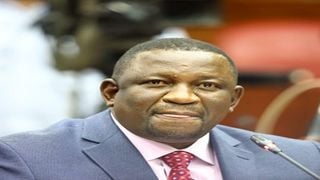
Mining, Blue Economy and Maritime Affairs Cabinet Secretary Salim Mvurya.
| File | Nation Media GroupBusiness
Premium
Mining permits approval on after four-year freeze
Kenya has started processing permits and licences for mining and prospecting of minerals after a four-year hiatus amid growing concerns from industry players over the slow pace of approvals.
Principal Secretary for Mining Elijah Mwangi said more than 400 applications are at different stages of approval by the Mining Rights Board.
Applications under consideration represent about a fifth of the estimated 1,500 submitted to the board since the partial lifting of the December 2019 moratorium last October.
The State Department of Miming subsequently asked miners and prospectors of minerals whose permits and licences had been affected by the blanket suspension to update their documents.
The papers they were required to provide include bank statements or audited financial reports for the last three years as proof of cash to undertake mining or prospecting, a list of shareholders, tax compliance certificates and programme of work.
“We have started the process of evaluating those applications to grant the licences,” Mr Mwangi said in a telephone interview. “There should be nobody denied a licence by virtue of expired documents, and that’s why we asked them for update.”
The Ruto administration is banking on ongoing reforms to gradually unlock the sector’s revenue potential, conservatively estimated at $6.6 billion (about Sh865 billion) or nearly 10 per cent of Kenya’s gross domestic product.
The current actual value of Kenya’s minerals is estimated at less than Sh40 billion. The latest official data published by the Kenya National Bureau of Statistics put the value at Sh35.23 billion in 2022, a 16.5 per cent growth over Sh30.24 billion in the prior year.
Though mining has been going on in the country for over 50 years, productivity has remained low, with a scale of operations limited to soda ash, mineral sands, and from 2013 Titanium ores in Kwale.
Kenya is also believed to hold significant deposits of copper, niobium, manganese, and rare earth, which largely remain under-exploited, dwarfing the mining sector’s contribution to the national economic output.
The Kenya Chamber of Mines, the industry lobby, is nonetheless concerned about the slow pace of approvals by the board which sits two times every quarter.
“While the MRB [Mineral Rights Board] is doing its best, we are concerned that unless there is a rapid results initiative that will allow them to convene for more days…, then it may take years to manage the backlog, granted that new applications are submitted every day,” the lobby’s chairman Patrick Kanyoro said.





